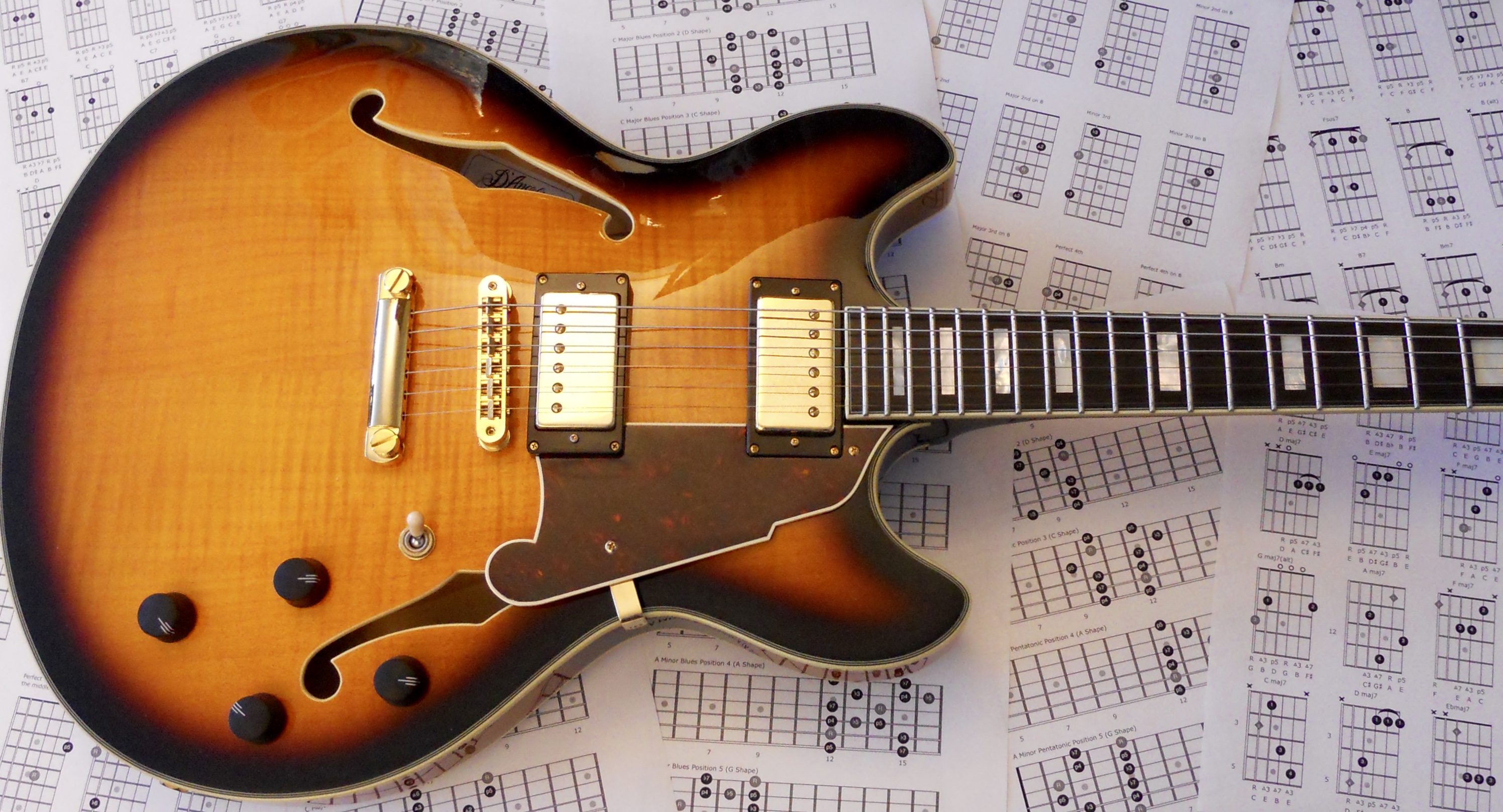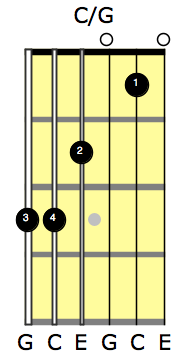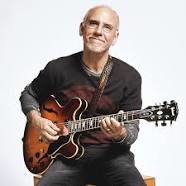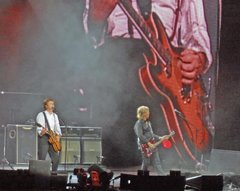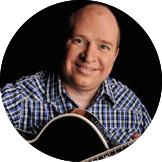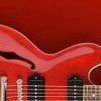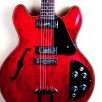-
Posts
309 -
Joined
-
Last visited
-
Days Won
36
Content Type
Profiles
Forums
Gallery
Events
Articles
Blogs
Downloads
Everything posted by V7#5b9
-
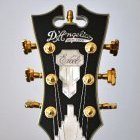
How Important Is Fret Radius To You
V7#5b9 replied to Blue Dog's topic in Guitar Gear, Amps, Effects, Pedals
I’m used to the standard 12” radius which seems to be a good compromise for both chordal and single line playing. All my electric guitar necks except for one have 12” radius. The exception has 14” radius which seems slightly better for bending, but I don’t even notice the difference any more. My acoustic guitar also has 14” radius. I’m sure the neck radius matters as well as the other neck dimensions and the neck profile in general, but I don’t recall trying anything other than “Size 12 or 14.” -

Monthly Recording Challenge - 54 "Play Me Some Blues"
V7#5b9 replied to UncleHammy's topic in Guitar Playing & Technique
@mark_h Bluesy all the way Mark. Love it! Stormy Monday - couldn’t find a better one for the occasion. Great sound. Hope you and your wife are feeling better soon. -

Monthly Recording Challenge - 54 "Play Me Some Blues"
V7#5b9 replied to UncleHammy's topic in Guitar Playing & Technique
@Wim VD Fine job on the Baby Elephant Walk! -
It’s very interesting and enlightening. I like to go deep. But, unless you play a fretless guitar, so does the bass player, you forget the piano and so on, the described affective musical key characteristics may not produce the desired effect. I’ve listened to some of the files and I’m so used to equal temperament that it sounds more natural to me. About 8o% of popular songs are written in major keys, 15% in minor keys and 5% use modes. Mode and tempo are two of the most important factors with respect to emotion creation, but there are other factors as well. For our purposes, it’s probably enough to make the following mode-emotion associations: Ionian mode (major key): Happiness, grace, serenity, solemnity Aeolian mode (minor key): Sadness, anger, dreaminess, tenseness, suffering Major & minor modes alternating: Tenderness Mode unclear due to tense, dissonant harmonies: Fear The other modes of the diatonic order are basically flavours of either major or minor ones: Dorian is a minor-type scale, but it sounds “lighter” or “softer” than often “heavy” sounding Aeolian mode. The Dorian mode is used in jazz, blues, and rock music. Phrygian is also a minor-type scale, closer to Aeolian, but it sounds more “Exotic.” Think Spanish composers. Lydian is a major-type scale, sounding bright and happy. Favourite of jazz and rock composers. Mixolydian is a major-type scale, but slightly darker sounding. The lowered seventh note gives it a bluesy, dark colour. It’s used in blues, rock, and jazz. Locrian is a minor-type scale with lowered 2nd and 5th notes making it the diminished mode with a distinct sound, but hardly ever used. It does find its way into jazz though. We also can look at individual chords which have both absolute sounds and subjective associations. Absolute sound is difficult to describe, and has to be learned as you become familiar with each chord. Subjective associations are easier to put into words. Major and minor chords sound stable (consonant) or resolved. They could be used to end a song. Diminished and augmented chords are unstable (dissonant). Diminished chords are less jarring (dissonant) than augmented chords. They are used as passing chords — they pull one stable chord to another. The sound of Suspended chords leaves you hanging. It ‘wants’ to resolve to the major or minor triad built on the same root. Power chords are neither major nor minor, used for either type, especially, in rock music (and even in some pop), as substitutes for full chords to give the accompaniment (rhythm guitar) a sparser, leaner sound. More specifically, most of us hear: Major chords as happy, heroic, or strong. Major 7th chords as beautiful, bright & jazzy. Major 6/9 chords as bright & happy. Minor chords as sad, lonesome, or haunting. Minor 7th chords as mellow & jazzy. Minor 9th chords as dark & soulful. Dominant 7th chords as bluesy or funky. Dominant 7#9 chords as bold & exciting. Dominant 9th chords as bluesy. Diminished chords as suspenseful, they build tension. Augmented chords as mysterious, eerie & dreamy. A minor 9th chord with a major 7th or a #11th can add drama to an ending - so can a major 7th. Perhaps it’s better that the aural quality of every key became the same. If you have to transpose to another key to accommodate your voice range, you won’t lose the intended effect. Uh, what the heck! It’s all subjective anyway. PS I’ve downloaded the 86-page PDF. I’ll check it out.
- 10 replies
-
- 3
-

-

-
- songwriting
- keys
-
(and 1 more)
Tagged with:
-
@Eracer_Team-DougH I like Wildwood’s earlier vid. It’s a bit longer and he talks more about the Sheraton II. This one’s funny, but the guy ain’t lying. He’s got chops, too.
-
Thanks everyone! Anybody entered to win?
-
@Eracer_Team-DougH & @NeilES335 will probably laugh at me because of my timing, but I have considered adding a spare to my ES-335 type D’Angelico from time to time. Doug’s purchase brought back memories of my first Sheraton which, I guess, would be considered Sheraton-I (not Sheraton-II as I mentioned in Doug’s thread) by today’s standards. Although it was a decent guitar, the stock pickups would not give me the sound I really wanted. The pots were not top of the line, either. I traded it in when I got the D’Angelico. The Sheraton has been upgraded since then, and the coil-tapping equipped vintage humbucking pickups along with 1” 500K Ohm pots make it a real deal at a reasonable price. I must admit that I love the ProBuckers. The guy at Long & McQuade plugged it into a Vox amp for me and there wasn’t enough time before closing to test another one. Another guy was pounding away on a piano and the louder I got the louder he got. The setup was great right out of the box. The neck pickup volume knob kept coming off during coil-splitting, but they fixed it on the spot. Anyway, got home, plugged it into my amp and sonic delight came out. I still have more testing to do, but my first impression is that the Sheraton-II Pro sounds as good as my D’Angelico. I got my spare. By the way, until the end of March 2018 you can ENTER TO WIN this baby.
-
It’s not exactly theory, but I couldn’t think of a better section to put it in. I’ve been posting Griff’s stuff quite a bit lately, but it’s all good and certainly worth watching. This video is different though because it deals with note reading and rhythmic note reading in particular. Even solid music readers may want to spend the 40+ minutes absorbing the information. After all, music reading for guitar has its intricacies. Griff covers 4/4 straight, 4/4 triplet, and 12/8 time signatures. The first half of the video may seem very basic, but the second half covers more tricky stuff. And as Steve says: “Learn all you can!”
-
@mm66 Moving your 3rd or ring finger between the 5th and 6th strings is certainly an option and you may need that ability, but in a situation when your 4th finger aka pinky isn’t doing anything, I would economize. Actually, @Blue Dog implied it in his post. For exercise 1 I would suggest an additional option. Here’s a C chord with the G in the bass. It’s a C chord in its 2nd inversion, but don’t worry about the theory of it at the moment. If you finger it according to the diagram, you won’t have to move your 3rd or ring finger at all. Even for Ex.2 you can hold this shape, just don’t play the sixth string or the low G note when you play the chord.
-
-
Hi Blue Dog. The answer is because it’s a more major (less bluesy), but still bluesy enough sound. It’s simply a major pentatonic scale with a flat 3 added. As you may or may not know the General Rule is that in Blues over the I chord you can play the major or minor blues sounds and over the IV and V chords you use only the minor blues sounds. The major sounding blues scale does not have the p4, b5 and b7. I hope this helps.
- 5 replies
-
- practice tool for
- blues scales
-
(and 1 more)
Tagged with:
-
Cool acquisition Six! This ES-135 should be a somewhat different, but pleasant experience for you. Congrats! ?
-
It sounds like you got yourself a great little amp, very versatile and to top it all off at a reasonable price. Congrats Ice! ? Out of curiosity I’ve just viewed a short demo of the Katana series. I’m not in the market for another amp, but others may be.
-

Monthly Recording Challenge 53 - "Unplugged"
V7#5b9 replied to UncleHammy's topic in Guitar Playing & Technique
@Nutty1 Nicely done! ? Word of caution though. It’s not about giving up. It’s about being able to play and enjoy yourself. Do not neglect your trigger finger. I had to deal with tendonitis and a trigger finger for six months. I went for physiotherapy. I was told that if I continue to play guitar I may never get rid of it. I stopped and I’m glad I followed the advice because I got rid of the trigger finger. My fingers still get somewhat stiff in the morning, but I continue to do prescribed exercises and warm up before practice and play. Wish you speedy recovery!- 60 replies
-
- 1
-

-
- guitar playing
- monthly recording challenge
-
(and 1 more)
Tagged with:
-
@Danny Robey Major Scale Mastery is part of the workout series and a supplement to, but not a replacement for, the Learn & Master Guitar course. You should start with the main course. When you reach Session 7, you’ll be learning about the major scale and that’s probably the best time to add the Major Scale Mastery workouts. As a matter of fact, you may want to consider adding all the available workouts to the main course at the appropriate stages. The Speed And Agility can be added early on, Jazz Chords can wait till Session 18. Steve will be adding more workouts in the future. I think he’s working on the Money Chords now.
-
Never saw The Beatles live, but I’ve seen Paul three times and Ringo once. Although it took Steve Krenz for me to get serious about guitar, The Beatles and Paul in particular, have always been my inspiration. Some think of Paul as the bass player, but he also is quite capable on guitar, piano and even plays some drums.
-
-
-
I don’t really name mine either, but I thought I’d have some fun with it too. So I came up with the idea of trying to match the names with manufacturers. From now on I call my “Jazz Trio”: Angelica, Caroline & Ibbie. I’ve found some interesting facts about the names as well. Angelica - “originates in Greek language and means "God’s messenger." Caroline - “originates in Germanic languages and means "free woman". It is a feminine form of Carolus, ultimately derived from Charles. Caroline has been one of the most popular feminine given names over centuries and in various spelling in different countries around the world. It was a popular name within royalty, including several queens of Great Britain. Caroline was also the name of Napoleon Bonaparte's younger sister.” Ibbie - “is a diminutive of Isabella. Isabella is a variant of Isabel. Isabel originates in Latin language and means "Promise of God". Ultimately, it is derived from Elizabeth, originating in Hebrew. Some sources suggest that Isabel is simply a Spanish and Portuguese form of Elizabeth. Most recently, the name Isabella was popularized by the character Isabella Swan in Twilight series written by Stephenie Meyer. Currently, it is a number one in the chart of popular feminine given names in the United States.” Name source: http://www.babynames.net
-
Acoustic Guitar Hymns: “It Is Well With My Soul” played by SK.
-
In this installment of the “Straight From The Horse’s Mouth” series we have a chance to listen to co-founder of the Musician’s Institute in Los Angeles, for which he produced the curriculum. He is co-author of the Guitar Compendium: three volume instructional book based on the praxis system. If you’re not familiar with Howard Roberts, you can read about him in VINTAGE GUITAR magazine. Here’s a couple of recently uploaded YouTube videos. I decided to start the first one @ 9:30 mark when the seminar really begins. HR Guitar Institute of Technology Part 1 HR Guitar Institute of Technology Part 2 And here’s Howard Roberts Live Serenata
- 2 replies
-
- 1
-

-
- howard roberts
- jazz guitarist
-
(and 2 more)
Tagged with:
-

Monthly Recording Challenge 53 - "Unplugged"
V7#5b9 replied to UncleHammy's topic in Guitar Playing & Technique
@IanD Well sung and nicely played with cool acoustic vibe and subtle strumming dynamics. ??- 60 replies
-
- 1
-

-
- guitar playing
- monthly recording challenge
-
(and 1 more)
Tagged with:
-

